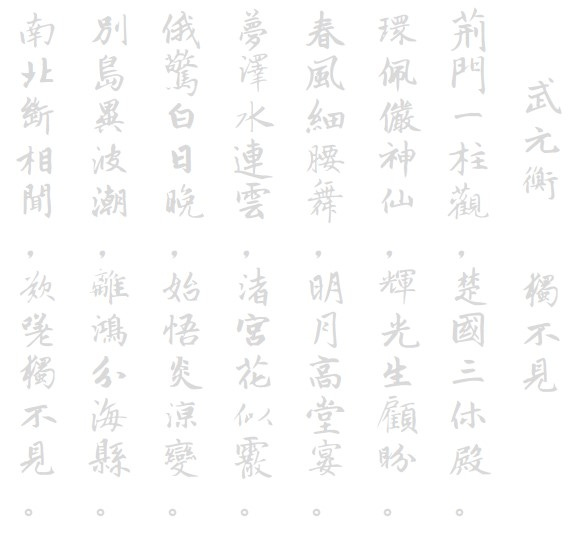Out of Sight
Wu Yuanheng
.
One-Column Pagoda, and the Palace called Three-Stop
So tall that visitors rest three times before they reach the top
Magnificent goddess, with pendants on her waist
Her flashing eyes swept the room and quickened those they graced
Her slight hips moved like a springtime breeze
And the moon shone bright on the lofty site where we met to hold our feast
Yunmeng Lake melted dreamlike into the sky
And the spring blossoms flew at the Palace of Zhu just as snowflakes fly
But suddenly I was startled that the long day had turned late
I came to learn all things in this world have all too short a date
Now on a distant island, I gaze at a distant tide
Our flock dispersed over land and sea, my loved ones scattered wide
From north and from the south, no word comes of their fate
My love is out of sight; all I can do is sigh and wait.
Out of Sight was a title used by many poets, all writing on the theme of a woman missing her husband who has been away for many years. This may be because he loves another, or is away at war, or has gone to work for the emperor. Only one poem with this title was judged good enough to be included in the 300 Tang Poems, but the Complete Tang Poems includes nine with this title, and they form a fascinating series, dating back to the 6th century, before the beginning of the Tang.
Often, the title of a poem gave name of the tune to which it should be sung. However, that doesn't seem to be the case for Out of Sight: some of the poems are very short, while others are medium length; some use short lines, others long. Instead, the poems are linked by two themes: the loneliness of a woman whose husband is away, and rich lifestyles. Both themes are brought out most clearly by Shen Quanqi in the single Out of Sight poem collected in the 300 Tang Poems.
Wu Yuanheng lived from 758-815.
This poem follows the old pattern of a first part full of descriptions of luxury and young love, designed to highlight the pain of separation in the second part.
One-Column Pagoda and Three-Stop Palace were the most splendid buildings in the city of Jingmen.
The reference to the Palace of Zhu gives the poem an explicitly historical setting, back in the state of Chu, a thousand years earlier.
武元衡 独不见
荆门一柱观,楚国三休殿。
环佩俨神仙,辉光生顾盼。
春风细腰舞,明月高堂宴。
梦泽水连云,渚宫花似霰。
俄惊白日晚,始悟炎凉变。
别岛异波潮,离鸿分海县。
南北断相闻,叹嗟独不见。



